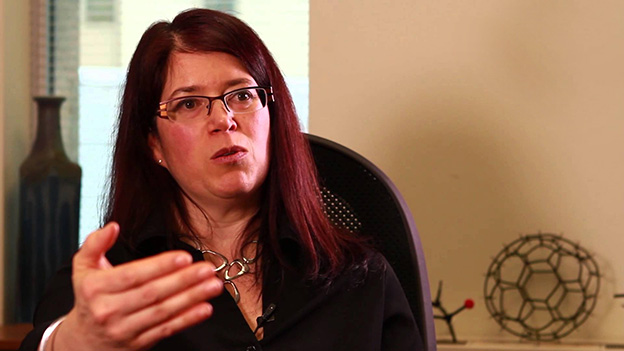Pippa Lock says you can take your class and flip it

3M Teaching Fellow Pippa Lock's flipped class technique is helping first year chemistry students better engage with course content.
McMaster’s new Student Mental Health and Well-Being Strategy encourages instructors to adapt their teaching methods to reflect the changing and growing needs of students.
At least one faculty member has already begun that process.
Pippa Lock, a 3M National Teaching Fellow, has veered away from traditional lectures – at least ones that take place in a lecture hall – and “flipped” the structure of her course backward.
While traditional courses devote class time devoted to lectures and leave students to study key concepts at home, Lock’s class works the other way around.
Students in her Introductory Chemistry class watch online lectures on their own, and Lock devotes what would otherwise be lecture time to discussions about real-world applications of chemistry.
“We prioritize interactive and engaging activities, such as live chemical demonstrations or discussions about things like how SCUBA diving can be related to concepts from gas laws,” says Lock.
She says this flipped class technique is particularly effective in the Introductory Chemistry class because students come to McMaster with very different backgrounds in the science.
“They have experience, strengths and weaknesses in different areas of chemistry,” says Lock. “So for some of them, the course content is review and they work through it quickly. For others, the content is completely new and they need to take more time with it.”
Flipping the class also means more flexibility and accessibility for students who need accommodation for mental-health and other reasons.
The Student Mental Health and Well-Being Strategy, launched this week, recommends that faculty use course design to reduce unnecessary stress on students.
“Watching online modules means having flexibility in the timing and pacing of consuming course content,” says Lock. “You can watch them wherever you want, whenever you want – and even watch them over again if you need to. You can’t pause and replay an instructor.”
The visual modules also include interactive menus, full-text scripts for each slide and a search feature that allows students to find exactly what they need.
It’s this control over a student’s own learning that Lock says provides a more personalized, less stressful learning experience.
“First-year students are experiencing significant transitions – not just the social side of university life, but also the academic side,” says Lock. “We’re interested in doing anything we can to support students in these transitions.”
Lock admits that creating the online modules for her class was time- and labour-intensive. But she recommends a gradual approach.
“Start small with a pilot module for a certain topic, then gauge student interest before going forward,” she says. “Experimenting with modules is a pretty reasonable way to get started.”

